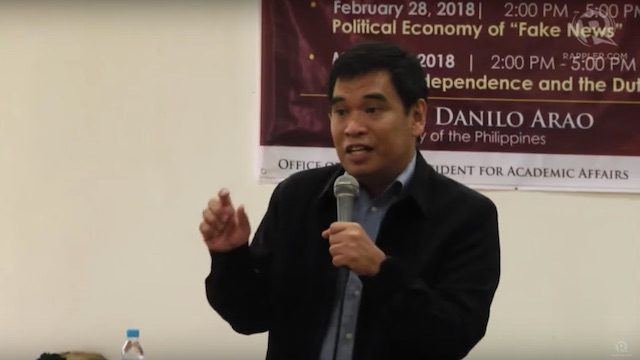SUMMARY
This is AI generated summarization, which may have errors. For context, always refer to the full article.

MANILA, Philippines – An educator called on state-owned media organizations in the Philippines to exercise editorial independence and stop serving as propaganda tools for the country’s presidents since the Marcos regime.
University of the Philippines (UP) College of Mass Communication professor Danilo Arao said state media should serve the public, not government officials.
“The problem of fake news in government can only be solved through editorial independence,” he said.
“Editorial independence is the freedom of editors to do what they want, subject, of course, to the normative standards of journalism.”
Arao gave a lecture at the Polytechnic University of the Philippines (PUP) on March 23, presenting his analysis of the current mandates of government-owned media organizations.
Arao noted how PTV4, the Philippine Information Agency (PIA), the Philippine News Agency (PNA), and Radyo ng Bayan have allowed themselves to become mere mouthpieces of Malacañang and distributors of “praise releases.” There are some state-owned media organizations that sometimes show objectivity, but this is generally not the case.
“It is [a] congratulatory tabloid. It’s far from being editorially independent,” Arao said.
He added that employees of state media can benefit from more training, too.
Why this discussion is important: State media in the Philippines don’t enjoy high ratings or wide readership, but the government claims that its platforms have increased in popularity since President Rodrigo Duterte assumed office.
Arao said the same rule should apply to state-owned and private media groups: owners should not interfere with editorial content.
PUP Department of Journalism chairperson Hemmady Mora supported Arao’s calls for editorial independence in government-owned media.
“Even in stations and media entities that may be identified with government, we agree that the highest ethical standards should be maintained. It’s like leading by example,” she said.
What Arao’s conclusions are: Arao said government media in the Philippines became propaganda tools only beginning with the Marcos regime. He noted that the now-controversial PNA was previously known for independent journalism.
Arao gave the following “concluding points” during his lecture:
- Government media need to exercise press freedom, of which editorial independence is an inherent part.
- Government media need to exercise self-regulation, an essential part not just of the news media’s promotion of press freedom but also of the government’s push for transparency and accountability.
- Government needs to make good on its promise of editorial independence.
- Government needs to stop media repression.
How they do it in other countries: Arao offered the British Broadcasting Corporation (BBC) as a model for the Philippines.
He noted how BBC is funded by the government, but private individuals control content.
“The [members of the] Board of Directors are not government officials. In cases that they are part of Parliament, there is disclosure of potential conflict of interest. The bottomline in BBC is government is a minority as far as control is concerned,” he said.
“Here in the Philippines, the opposite is true. Government wants absolute control of government media,” he added.
Arao also highlighted the crucial role government media play in the United States. He cited how Sesame Street kept airing in the US despite declining ratings because of the recognition that children need educational shows on TV.
“The purpose of [a] public broadcasting system is to produce alternative programs free from clutches of commercialism,” he said.
There are pending bills in Congress creating the People’s Broadcasting Corporation (PBC), a government television network envisioned to replace PTV4 and to meet international standards. – Rappler.com
Add a comment
How does this make you feel?
There are no comments yet. Add your comment to start the conversation.